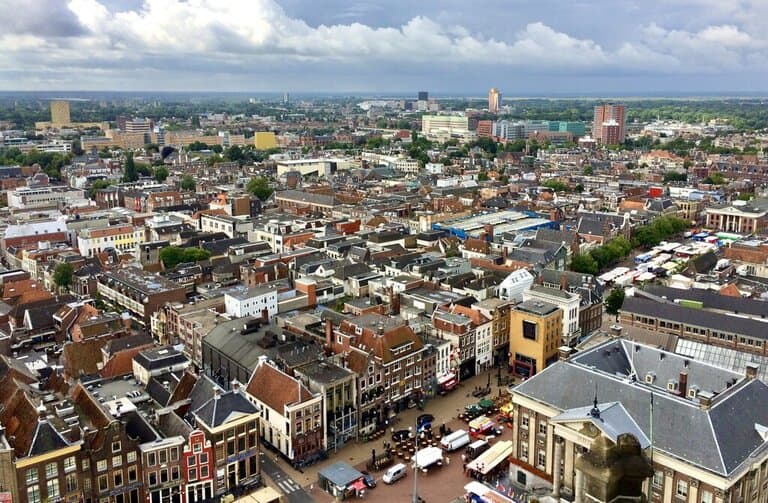Are you thinking of moving to the Netherlands and considering a life in Groningen? If you are, you’ll want to read through this detailed guide to the pros and cons of living in Groningen as an expat.
Groningen is a lively city in the northern Netherlands that doesn’t receive much international fanfare. It’s little known outside the country, which makes it a pretty nice place to live for many people. It’s a small city that’s easy to get around and there are work opportunities for foreigners.
Let’s start with a personal opinion: living in Groningen was not for me and the wife. We moved there with the intention of settling down, but after less than a year I asked my employer to relocate me to Amsterdam (which I absolutely loved living in). There were too many cultural and other challenges that we faced in our year in Groningen that made us not want to stay.
My personal experience aside, many expats love Groningen and choose to settle down, learn Dutch, and embrace life in the north of the Netherlands. By the end of this list of the pros and cons of living in Groningen as an expat hopefully you should have a better idea if it’s a good fit for you or not.
If you’re a total Groningen novice, be sure to read through my guide to Groningen in conjunction with this article!
- Groningen – Quick Glance
- The Pros and Cons of Living in Groningen as an Expat
- Pro #1: It’s a very affordable city to live in
- Con #1: The city lacks a “wow factor”
- Pro #2: You will cycle everywhere
- Con #2: The weather
- Pro #3: Expat tax breaks
- Con #3: So many university students
- Pro #4: You won’t technically need to learn Dutch
- Con #4: It will be hard to make friends without speaking Dutch
- Pro #5: It’s a very safe place to live
- Con #5: Your bike will still get stolen
- Pro #6: Work-Life Balance
- Con #6: Limited professional growth without speaking Dutch
- Pro #7: You don’t have to deal with obnoxious tourists
- Con #7: You’ll have to meet your friends elsewhere when they come visit
- Pro #8: The Groningen Vismarkt is the best outdoor market in the Netherlands
- Con #8: It’s a 2-hour train ride to the airport
- Pro #9: The city is small and easy to get around
- Con #9: Securing housing can be a pain
- Pro #10: The city center is vibrant and happening
- Con #10: The Groningen Gas Field
- Pro #11: It’s a good place to raise children
- Con #11: Small Expat Community
- Bonus Con: The Dutch Healthcare System
- Final Word
Groningen – Quick Glance
- Population: 360,000 metro area, 238,000 city proper
- Time zone: Central European Time
- Elevation: 23 ft (7 m) makes it one of the highest Dutch cities
- Climate: North Sea oceanic climate – rarely gets hot or cold
- Average home price in 2023: 324,000 euros
- Average rent for 1 bedroom apartment in 2023: 988 euros in city center
- Main industry: education and hospitality
The Pros and Cons of Living in Groningen as an Expat
If you’ve found this page you’re probably wondering if you should move to Groningen or not. So without wasting any more time let’s go through the pros and cons of living in Groningen, Netherlands. We will go through them in a pro, con, pro, con, etc format. Then you can make an informed decision if living in the northern Netherlands is for you!
Pro #1: It’s a very affordable city to live in
Let’s start with a very important advantage to living in Groningen: the cost of housing. The Groningen province is ranked as the cheapest of the Netherlands’ 12 provinces and the city itself offers housing at pennies on the dollar compared to Amsterdam.
The average cost of a new home in Groningen is 324,000 euros. That’s almost half of what it is in Amsterdam, where a new home runs you 600,000 on average.
Apartment rentals are considerably cheaper too. The average one bedroom apartment in the city center goes for less than 1000 euros per month, whereas you’re looking at 1730 euros in Amsterdam and 1403 euros in Rotterdam. If you live outside the city center your apartment can be downright cheap.
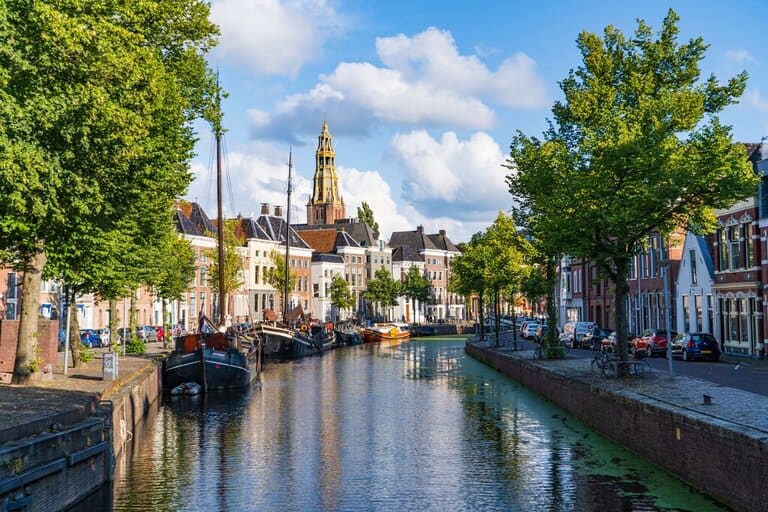
One of the main reasons it’s so affordable is due to the high student population. Students don’t really make any money but still have to live somewhere, so that keeps local apartment costs down.
Costs for things like groceries and petrol are pretty standard across the country, so you won’t find those to be much cheaper than in the southern part of the country. Food and drink prices at restaurants are also on par with most of the country. Cheaper than the touristy parts of Amsterdam for sure, but not any different than the rest of the country.
In summary, the key to the cost of living in Groningen is housing. It’s significantly cheaper than popular expat cities like Amsterdam and Rotterdam. But things like groceries, eating out, and everyday items are similar to the rest of the country.
Con #1: The city lacks a “wow factor”
The biggest turnoff of living in Groningen for many people is that it lacks distinguishing characteristics and unique charm. There is essentially nothing “special” about the city, even by Dutch standards (sorry Groningen friends, but I know you reluctantly agree). It’s just a nice little city with no wow factor.
Living in Groningen is not living in Amsterdam. Or Rotterdam. Or Copenhagen or Berlin or Paris. The list goes on. Your friends have never even heard of Groningen and they probably aren’t gonna be dying to visit.
If you’re used to living in cities, you might get bored after just a few months in Groningen. There is always something going on in the city, but nothing uniquely defining about it.
Some people will argue this is a benefit, though. Just a quiet city life in a place that isn’t full of tourists with a high standard of living. You might look at it this way too. And if you do, great! One more pro of living in Groningen! But if you’re like me, it’s just one more drawback of the city.
Pro #2: You will cycle everywhere
The Netherlands is known for cycling. You probably know that by now. But nowhere exemplifies that more than Groningen. A higher percentage of commutes are made by bike in Groningen than anywhere else in the world.
So needless to say, you can – and will – bike everywhere in Groningen. The cycling infrastructure in Groningen is extensive. Bike lanes are literally everywhere and bikes have priority in the city. Bike parking is also everywhere. The only issue you might have is finding a parking place on a busy street on a Saturday night!
Cycling is also one of the many things that keep the Dutch fit. Even though Groningen is ridiculously flat, you will burn a lot of calories biking everywhere. And perhaps the best part of all? Biking is completely free!
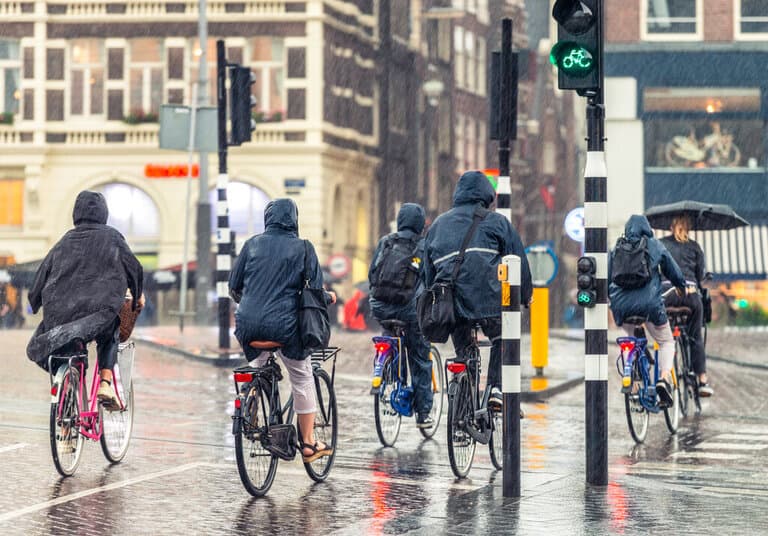
Con #2: The weather
The weather in the northern Netherlands can only be described as flat out rubbish for the majority of the year. The weather in Groningen is often dreary, chilly, and windy.
Rainy days are commonplace in Groningen, especially in the winter. It doesn’t rain too much in terms of total precipitation. It’s just that it’s like a constant light rain that doesn’t seem to stop. Add on the fact that in December the sun doesn’t rise till almost 9 AM and sets by 4:30 and you have a recipe for seasonal affective disorder.
Summers are better but can still be grey and rainy, especially July and August. May and June are usually the warmest and driest months, though every year is different.
Summer average high temperatures are around 73 degrees (23 C) and winter highs are around 42 degrees (5.5 C). Overnight winter lows are usually around freezing and summer lows are cold enough to need a jacket in the morning.
The good news is that nice days do exist and from May – September there are more nice days than dreary days. Depending on where you are from, however, the rainy days can be a real kick in the teeth. Many people find it difficult to adjust to the weather in Groningen so take that into consideration when planning your move.
Pro #3: Expat tax breaks
This goes for everywhere in the Netherlands and not just Groningen, but one of the biggest incentives for expats moving to the Netherlands is what is known as the “30% Ruling.” This is a significant tax break for foreigners that reduces their taxable income by 30%.
As an example, if you were making 100,000 per year (you absolutely will not make that much in Groningen unless you are executive level) you would be taxed as if you only made 70,000. You can benefit from this ruling for 5 years maximum.
Pretty cool, huh? But why offer this tax incentive to foreigners? Well, a lot of tax money goes to public pensions in the Netherlands. As a foreigner, you are not eligible for that pension unless you relocate permanently and become a citizen.
Therefore, the 30% Ruling basically saves you from paying other people’s pensions. Hence why it’s only allowed for only 5 years. After that they assume you’re here to stay and you gotta pay full taxes just like any other Dutch citizen.
It really is a huge incentive for moving to the Netherlands. For me, it saved me well over 1000 euros per month. My effective tax rate ended up being lower than my effective tax rate in the United States! In a “socialist” European country!
The 30% Ruling comes with one big disclaimer, though. You must be on a specific skills shortage work visa for it to apply to you. If you are an EU citizen you can work freely in Europe and are not eligible. Only people from non-EU countries are eligible. And not every type of job fits the criteria.
If you’re working in the service industry you will not qualify. If you are a digital nomad you will not qualify. If you plan to enter the country on a working holiday visa or a visitor visa and then find a job you will not qualify. You have to be recruited from overseas to fill a specific position as a “highly skilled migrant”.
That might sound daunting but there are tons of jobs that meet the requirements for the skills shortage. The Netherlands is not a big country, but it has a big economy. They often rely on highly educated foreign workers and you can be one of those.
The biggest difficulty will be finding an English speaking job in Groningen. They are available, but not in the quantity that you’ll find in Amsterdam or Rotterdam.
Lastly, if you enter the country as the spouse of someone with a highly skilled immigrant work visa you are not eligible for the 30% Ruling. You will be on a dependency visa. If you find your own job separately before moving to the Netherlands and you and your spouse both have offers and apply separately through immigration you could also get the 30% Ruling, but not as a dependent.
Con #3: So many university students
If you’re a university student obviously this is a huge pro, but if you’re a working professional you might be a bit turned off by the sheer amount of university students in Groningen. The University of Groningen is huge and about 30,000 students attend classes there regularly. Approximately 25% of Groningen’s population is enrolled at a university.
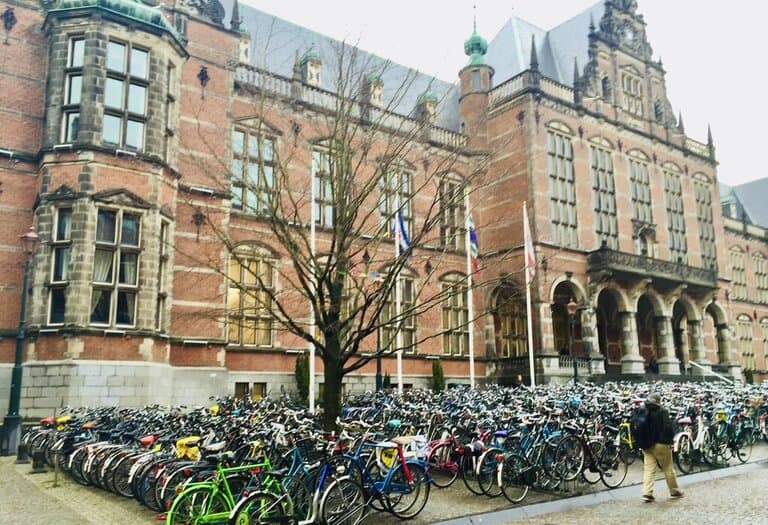
This also includes another huge school in Groningen, the Hanze University of Applied Sciences, which itself has about 28,000 students. So when you think about the population of adults between 18 and 65, a huge proportion of them are students.
As a working professional, this can be a bit exhausting. Everyone is so young and so many bars are dirty and grimy. It keeps the rent prices down though!
Pro #4: You won’t technically need to learn Dutch
Moving to a foreign country that speaks a different language can be a challenge. Luckily, the Dutch are some of the best English speakers in the world. And yes, that includes English speaking countries.
You don’t really have to speak a word of Dutch to live in Groningen. Knowing Dutch will make your life a hell of a lot easier, but you don’t technically need to know any. It can be done. Just ask my wife!
There are two main issues with not knowing Dutch in Groningen. The first is finding work, as there are far fewer English speaking jobs than in the southern Netherlands. The second is that socially, not speaking Dutch will limit your social circle substantially. More on both of those later.
Lastly, if you don’t speak much English, you are going to struggle in Groningen. Very few people move to the Netherlands without being fluent in English or Dutch.
Con #4: It will be hard to make friends without speaking Dutch
By far the biggest struggle for us living in Groningen was the difficulty in fitting in socially. Groningen is not full of expats like Amsterdam and Rotterdam. You might be the only non-Dutch person at your office. This makes it much more difficult to make friends and socialize.
The reasoning behind this is simple. For as well as the Dutch speak English, if you’re the only one in a group who doesn’t speak Dutch, you’re the odd man out. Everyone isn’t gonna speak to each other in English just for you.
The people are friendly, so it’s not like everyone will just ignore you. Individual people will chat with you in English. But you’re gonna miss the group conversation. There is not a whole lot you can do about this other than learning Dutch.
Another big factor is that the Dutch like to keep their social lives and their work lives separate. Colleagues don’t really hang out outside of work as much as you might be used to. Things are changing, however, and the younger generations see less stigma with hanging out with work colleagues.
Historically though, colleagues only hang out when it’s a work event. I will say that this phenomenon is a bit different in Amsterdam, where there are so many expats and Dutch folks are used to socializing with foreigners. In Groningen, it’s a bit more traditional. So don’t expect to make friends with your Dutch work colleagues. Consider it an added bonus if you do.
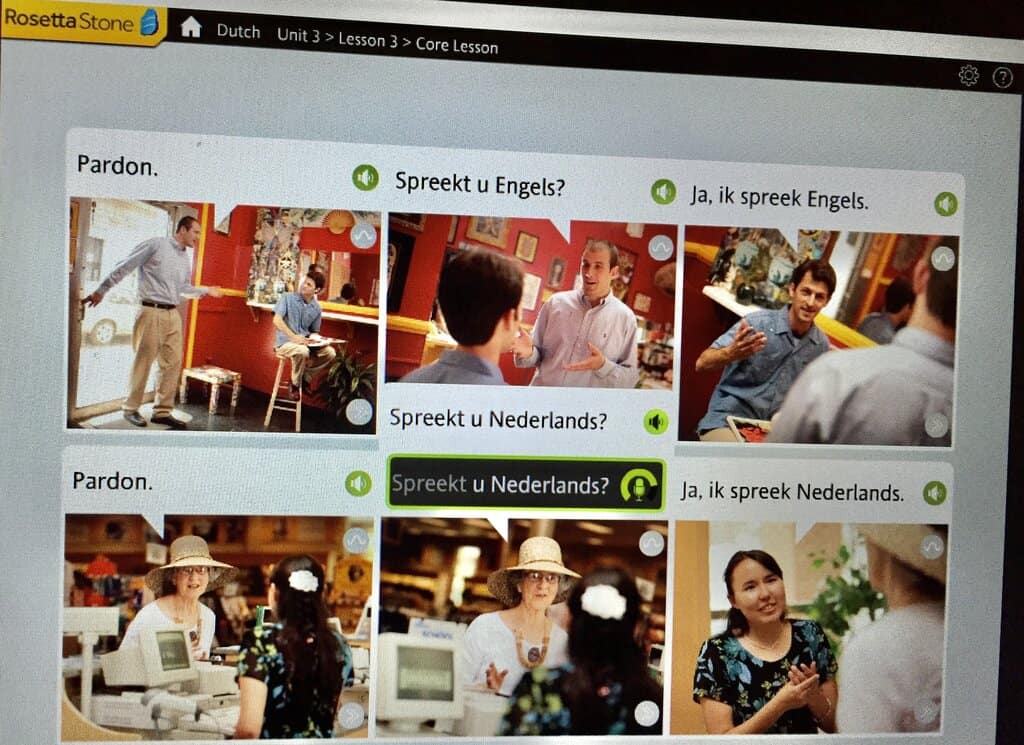
So how do you make friends and socialize in Groningen? Well, that’s a good question. Joining sports clubs and doing other activities like rock climbing or ice skating is a great way to meet people. There are also expat groups on meetup.
Lastly, if you’re a student everything I’ve said goes totally out the window. There are tons of international students at the University of Groningen and it’s an entirely different world. You will have tons of international friends. My discussion here is just for professionals in a full-time working role.
Pro #5: It’s a very safe place to live
Groningen is a pretty safe city to live in. While violent crime has been increasing since the Covid—19 pandemic, the crime rate is still considered “very low”. Homicides do happen, but they are rare.
Assaults on women walking alone at night have been known to happen (as in any city atmosphere), so following basic safety protocols is still important. Women should avoid walking on empty streets at night and everyone should always be aware of their surroundings. But overall, crime is hardly a worry in Groningen, with one notable exception (see con #5)
Violent crime rates in the Netherlands are some of the lowest in Europe. In general, you’re unlikely to be the victim of a violent crime in Groningen or anywhere in the Netherlands, but follow basic safety precautions anyways.
Con #5: Your bike will still get stolen
While life in Groningen might be extremely safe, you will almost certainly be the victim of one particular crime that is rampant all over the Netherlands: bike theft. Having your bike stolen is a rite of passage for a newly arrived expat in the Netherlands.
Bike theft in Groningen happens every day, everywhere, and at all hours of the day and night. No matter what you do your bike will get stolen at some point. It doesn’t matter if it’s locked. The thieves don’t care.
If you leave it unlocked it will definitely get stolen. But the thieves have tools to break your lock. So if they decide they want your bike today, there’s not much you can do.
I had lived in Groningen barely one week before my bike got stolen. It was literally the first time I parked at my office. Luckily bikes are cheap and plentiful and you can just buy a new one (which was probably stolen at some point).
If you don’t want to deal with a stolen bike you can always choose to rent a Swapfiets. Swapfiets is a monthly bike rental service. “Fiets” means “bicycle” in Dutch. It’s called “swap” because if it needs maintenance they will just give you a different one and take the broken one.
It’s much more expensive than buying a basic used bike. Swapfiets in Groningen go for about 23 euros per month. But the thieves won’t steal them because they are branded and it’s too much work to repaint them before trying to resell.
Pro #6: Work-Life Balance
The Dutch government requires employers to provide at least 20 days of annual leave per year for staff. Most employers offer more than this, usually around 24 or 25 days. So you’re likely to get 5 weeks of vacation with your job in Groningen.
If you come from a European country you’re probably used to this, but if you come from the US or somewhere like Japan this is going to seem too good to be true.
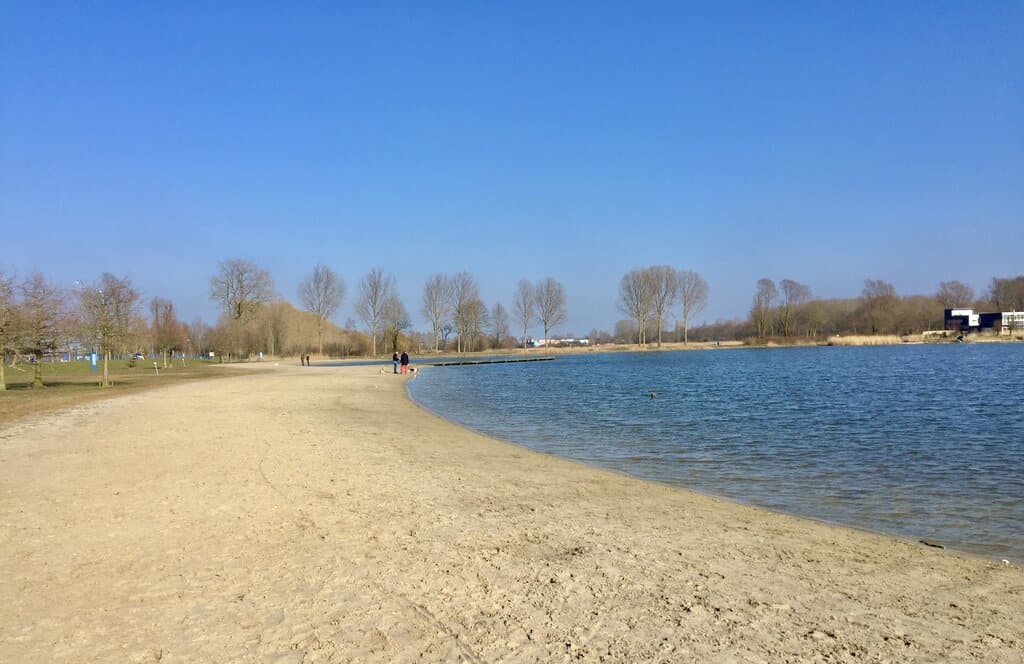
In addition, unlike in the US, everyone takes all their vacation days in the Netherlands. The work-life balance is solid in Groningen. The work week is 40 hours and most Dutch people stick to that like they’ve sworn their children’s lives on it. When 5:00 rolls around they are gone. The work can wait till tomorrow.
The Dutch government also requires employers to pay an 8% holiday bonus each year to staff. This is what’s known in the Netherlands as the “13th month.” You basically get a guaranteed 8% bonus every year and this is supposed to pay for your summer vacation. You don’t have to use it for vacation, but that’s the intention.
Con #6: Limited professional growth without speaking Dutch
While you can find English speaking jobs in Groningen, management is almost guaranteed to be 100% Dutch. It is almost impossible to climb up the corporate ladder without being able to converse and attend meetings in the Dutch language. You might be able to in Amsterdam if you’re a computer programmer or in The Hague if you work in international diplomacy. But you likely won’t have that luxury in Groningen.
I worked for a large engineering consultancy who had a small satellite office in Groningen. Out of 80 people in the office there were only 3 of us who didn’t speak Dutch. It was hard being the odd man out most of the time.
I took learning Dutch very seriously, but it’s a tough language to learn and even after years of classes and practice I couldn’t speak enough to have a normal paced business conversation. So this really limited my career growth.
Challenges like this are one of the main reasons most people eventually leave the Netherlands and settle back in their home countries. If you do manage to learn Dutch, however, your future in Groningen will be bright!
Your employer will encourage you to learn Dutch and might even pay for classes for you. It’s good – and respectful – to at least make an attempt to learn the language. Knowing some Dutch will make many things a whole lot easier. From reading letters in the mail to knowing what’s on the menu without having to take out your phone, it is worth it to try to learn.
You likely will never become fluent in Dutch but I urge you to try anyways. I say this mainly because it’s hard to immerse yourself in it. Even if your colleagues are all speaking Dutch to each other and you’re trying to listen, they’ll just turn to you and say it in English if you look confused. You never get into that situation where you can’t understand each other and have to use hand gestures and whatnot, which really helps for learning a language.
The only people I knew in the Netherlands that became fluent in Dutch had a Dutch partner. Someone willing to be patient and speak Dutch with them. So if you’re really looking to learn, try dating a local!
I got as far as I could in Dutch classes, finished all the online courses and phone apps, yet still couldn’t hold a normal-paced conversation in Dutch after four years of trying. I could read anything you gave me. But when it came down to it I just couldn’t keep up with the pace of conversation. I eventually gave up, defeated, and left the country.
I wish you better luck than me with learning Dutch!
Pro #7: You don’t have to deal with obnoxious tourists
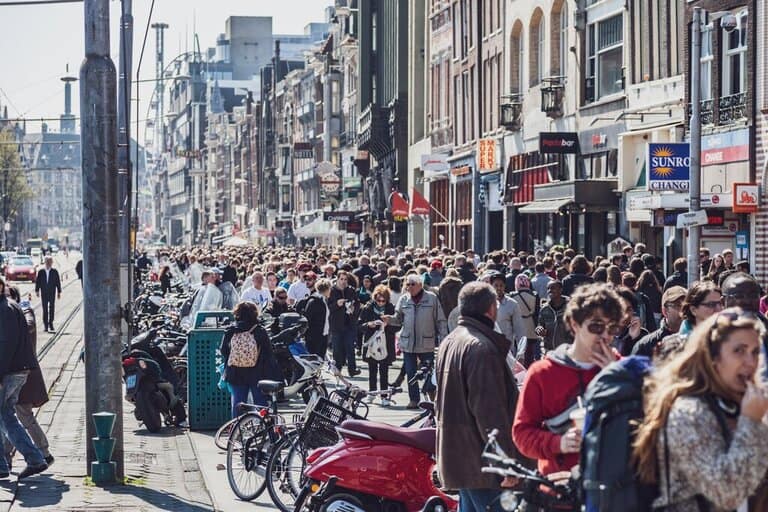
Perhaps the biggest downside of living in a famous European city is the constant stream of tourists that flood the city year round. That’s not going to be a problem living in Groningen, though! While there are some cool things for visitors to do in Groningen, the city receives few tourists.
Nobody keeps official numbers of visitors to Groningen, and relying on airport arrivals is unreliable since most visitors arrive by train. But one walk around the city center will make it blatantly obvious that it’s not full of tourists even on the nicest summer day.
One of the downsides of Amsterdam and some other touristy places in the Netherlands like Giethoorn or Gouda is that they can just get too damn crowded. And in Amsterdam especially, those tourists can be downright obnoxious, coming for a weekend of drinking and debauchery in the city. Not to worry in Groningen, though. Any debauchery you witness will be the work of the local student population!
Con #7: You’ll have to meet your friends elsewhere when they come visit
Moving to the Netherlands will inevitably invite long lost friends to come visit you, especially if you’re from outside of Europe. But the common theme in those visits will be “hey I’m coming to Amsterdam can you meet me there!?” This is just how it goes when you live in a small Dutch city that no one has ever heard of.
And while this might be a con in the sense that you’ll have to travel and stay somewhere to meet your friend, you can also choose to look at it as an excuse to spend another weekend in Amsterdam if you’re a fan of the city.
If one of the reasons you moved to Groningen is that you don’t like big cities, well then maybe you can try to convince your friends to meet you in Groningen. If they’re a close friend they probably will!
Pro #8: The Groningen Vismarkt is the best outdoor market in the Netherlands
While Groningen doesn’t have too many claims to fame, it does boast hands down the best outdoor market in the Netherlands. The Groningen Vismarkt is massive and operates just about all day Tuesday, Friday, and Saturday. It’s in a large cobblestoned square in the city center, surrounded by cafes, restaurants, and shops.
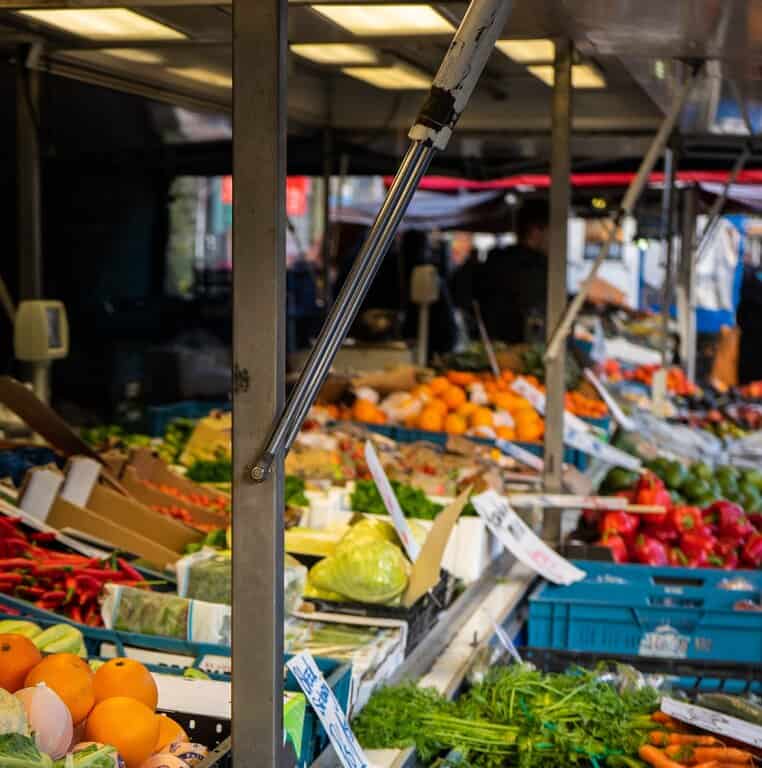
While “vismarkt” might translate literally to “fish market”, there is so much more to the Groningen Vismarkt than just fish. The fresh fish is certainly plentiful and excellent, but you can find just about anything at the Vismarkt. From cheese and cured meats to hand-sewn mittens and fresh baked stroopwafels, you can find it at the market.
If you eat mainly fresh foods it’s totally possible to do all your grocery shopping at the market. We used to go every Saturday and stock up on fish, meat, fruit, and vegetables. We never bought that stuff from the supermarkets. Throw in a lunch of kibbeling (lightly fried fresh white fish with a dipping sauce, one of the Netherlands’ main culinary delights), and you’ve got yourself a lovely little Saturday at the Groningen Vismarkt!
Con #8: It’s a 2-hour train ride to the airport
While Groningen might have its own airport, chances are you probably won’t ever actually go there. There are very few flights in and out of the airport so unless you’re planning a trip to Gran Canaria you will never see it. To get anywhere you’ll have to take the train to Amsterdam Schiphol Airport.
Luckily there is a direct train that runs every hour (and plenty of other options with quick transfers) and it only takes two hours to get there. It also depends on where in Groningen you live. If you’re not close to the Groningen Central Station then you have to add travel time to the station into the mix.
Essentially, your travel time when trying to fly anywhere increases significantly. And when you consider that most flights within Europe are less than 2 hours, the time it takes just to get to the airport ends up being the majority of the entire journey. It might seem like a trivial thing, but it’s something you need to consider when choosing to live in Groningen (or really anywhere in northern or eastern Netherlands), especially if you like to travel.
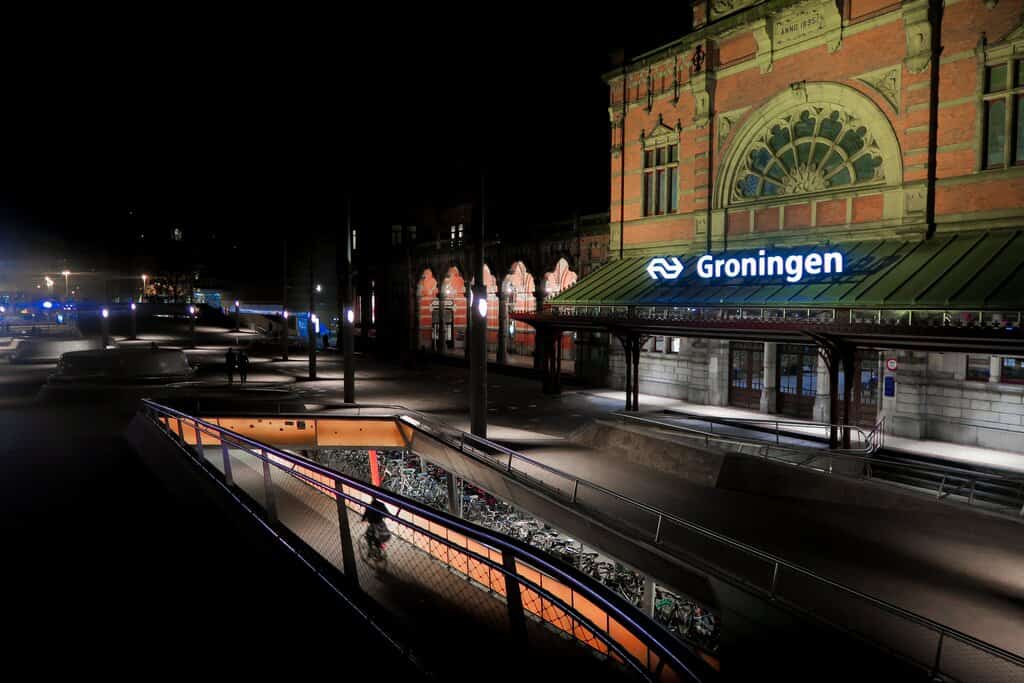
Pro #9: The city is small and easy to get around
One of the best things about living in Groningen is that the city center is so compact and super easy to get around. While you’ll likely bike everywhere, Groningen is very pedestrian friendly as well, and walking everywhere couldn’t be easier. If you live and work in the city center – which is a small island between canals – then it’s entirely feasible to live your life just walking around, not even with a bike.
Now this is the Netherlands after all, so you wouldn’t do that. You will want a bike. But I’m just making the point here that the city center is so small you don’t even really need one. Plus the bus system is pretty good and connects the city center to all the neighborhoods outside.
Con #9: Securing housing can be a pain
While housing in Groningen is certainly affordable, actually finding a place to live can be challenging to say the least. Since the Covid-19 pandemic there have been numerous complaints from residents – especially students – that finding a decent place to rent is difficult and exhausting.
The reason boils down to the fact that with so many students coming and going each year, the rental market is saturated and landlords have the ability to make unreasonable demands, as they know that they will find a tenant due to the competition.
There have also been dozens of reports of landlords discriminating against international students, not wanting someone to rent their place who isn’t Dutch. This might sound shocking, but old Dutch people can be very nationalistic and sometimes even downright racist. These discriminatory reports do not surprise me at all.
As an expat you can avoid this situation by looking for nicer rentals on the higher end of the rent scale. There will be a lot less competition for the places that rent higher than 1400 euros per month or so. But then you lose some of the affordability that Groningen is known for. If you go for the cheaper places, just prepare to have a difficult time finding a rental with all the competition from students.
Pro #10: The city center is vibrant and happening
There’s no doubt that for a small city, Groningen is actually pretty vibrant. There is always something going on and the massive student population makes it a hotbed for nightlife. Young Dutch people from all over the northern Netherlands head into Groningen when they want to party.
If you’re on an early morning train (to the airport perhaps, see con #8) it’s not uncommon for there to be dozens of drunk 22-year-olds heading back to wherever they came from after a long night of partying in the city. There are tons of bars and nightclubs and they’re open till the wee hours of the morning.
Now, if drinking with university students doesn’t sound like your cup of tea, there are still fun things to do in Groningen and plenty of nicer bars that students don’t frequent. There are also some good microbreweries and cocktail lounges.
On the sober side, the city is vibrant during the day as well. Fairs with rides and games come through quite often. Events in the main square are pretty common too. There always seems to be something going on to keep the residents entertained.
The main city park – the Noorderplantsoen – also hosts a huge music and performing arts festival every August that runs for over a week. The Noorderzon doesn’t attract any well known bands, but it’s a fun event nonetheless.
Con #10: The Groningen Gas Field
We can’t talk about Groningen and ignore the elephant in the room. The Groningen province sits on the largest reserve of natural gas in all of Europe. And while this natural gas reserve has brought riches to the region, it’s also brought something else: earthquakes.
Now, let me make it very clear from the beginning that these are tiny earthquakes. We are talking about a 4.0 on the Richter Scale max. And most of the quakes are much smaller than that. They are baby quakes, rarely large enough to feel.
So what’s the connection between natural gas and earthquakes? Well, to put it simply: extracting the gas from the earth is a complex process that disrupts the natural ground conditions. The fracking process has been linked to earthquakes all over the world. You can read more about fracking-induced earthquakes here.
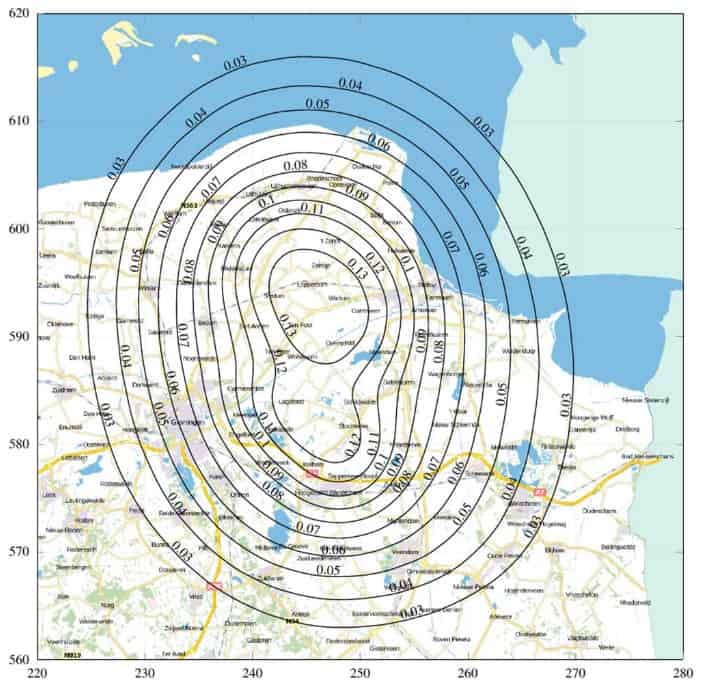
The quakes are usually too small for you to feel, especially in central Groningen which is well outside the epicenter of Loppersum. The problem is that Dutch houses are almost exclusively built from brick, which in building terminology is a type of unreinforced masonry. So while you might not feel it, the same cannot be said about your brick house.
The good news is that no building has ever collapsed due to Groningen’s earthquakes. Only minor damage has occurred and most of that is in the villages outside the city. The Dutch government has also announced that they will close the Groningen Gas Field by 2030 and stop fracking, which will ease the seismic activity in the region.
Pro #11: It’s a good place to raise children
Life in Groningen is quite safe (see pro #5) and outside of the student-heavy city center the neighborhoods are very family friendly, making them great places to raise children. For expats, there is an excellent international school that operates in English if you don’t plan on immersing your kids in the Dutch language.
The neighborhoods in Groningen are quiet and well laid out for supervising children. There are not a whole lot of complaints you hear from parents about the city itself when it comes to their children.
Now, when those children are old enough to be on their own and start each morning drinking energy drinks and smoking cigarettes that’s a whole other story. We won’t get into that here! I call two Red Bulls and a pack of cigarettes “The Dutch Breakfast”. Patent pending.
Con #11: Small Expat Community
One of the biggest drawbacks about life in Groningen as an expat is the lack of other expats. This might not sound like a concern if you want to immerse yourself in the culture, but as we have already discussed, making friends with Dutch people in Groningen can be extremely challenging. Having other expats around who don’t speak the local language is a huge benefit of moving to a foreign country and goes a long way to preserving your happiness.
There is an expat community in Groningen, but it is small. There is an expat Meetup group that meets up monthly for drinks. There are about 1500 members, which sounds like a lot but not all of them are active. So it is possible to meet other like-minded expats that way. It’s just difficult to naturally and fluently get to know other expats without specifically looking to do that.
On the contrary, if you live in Amsterdam your social circle will naturally include expats and Dutch locals alike without having to put the effort in. There are just so many. In Groningen, you’re just gonna have to put some specific effort in that regard.
Bonus Con: The Dutch Healthcare System
Let’s finish with one of the top things expats quote when asked what they don’t like about living in the Netherlands: the Dutch healthcare system. That is not to be confused with the Dutch health insurance system. That is actually quite great.
While the Netherlands doesn’t have universal healthcare like the rest of Europe, its private system is federally subsidized and required by law for all citizens to have. Health insurance costs about 110 euros per month and it covers everything.
What people complain about is the actual healthcare in the country. The process of going to doctors and getting treated. There’s a running joke among expats in the Netherlands that all Dutch general practitioners do is tell you to take paracetamol and call back in a week if you’re not better.
It’s funny because it’s actually true. That’s literally what they do. The Dutch healthcare system can only be described as a “just walk it off” attitude.
By law you’re required to go to a GP (“huisarts” in Dutch) for any ailment before you can be seen by a specialist. GPs basically work in what looks more like a university professor’s office than a medical office. You sit at a desk and tell them your complaint. They then tell you to give it a few days and come back if it’s not better.
Your GP is basically just a middleman and typically offers little to no actual medical advice. Where you want to end up is a specialist at a hospital. After a few visits hopefully you’ll be able to navigate the system a bit better!
Final Word
Hopefully by now you have a much better picture of what it’s like to live in Groningen. We have gone through all the pros and cons of living in Groningen (though there are probably many more) and you should be able to make an informed decision of if it’s right for you.
Most people find a happy and enjoyable life in Groningen, even if I wasn’t one of them. If you do decide to move there I hope you make the best of it!

